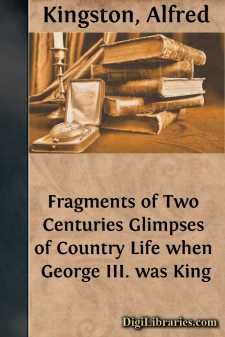Categories
- Antiques & Collectibles 13
- Architecture 36
- Art 48
- Bibles 22
- Biography & Autobiography 813
- Body, Mind & Spirit 142
- Business & Economics 28
- Children's Books 14
- Children's Fiction 11
- Computers 4
- Cooking 94
- Crafts & Hobbies 4
- Drama 346
- Education 46
- Family & Relationships 57
- Fiction 11828
- Games 19
- Gardening 17
- Health & Fitness 34
- History 1377
- House & Home 1
- Humor 147
- Juvenile Fiction 1873
- Juvenile Nonfiction 202
- Language Arts & Disciplines 88
- Law 16
- Literary Collections 686
- Literary Criticism 179
- Mathematics 13
- Medical 41
- Music 40
- Nature 179
- Non-Classifiable 1768
- Performing Arts 7
- Periodicals 1453
- Philosophy 64
- Photography 2
- Poetry 896
- Political Science 203
- Psychology 42
- Reference 154
- Religion 513
- Science 126
- Self-Help 84
- Social Science 81
- Sports & Recreation 34
- Study Aids 3
- Technology & Engineering 59
- Transportation 23
- Travel 463
- True Crime 29
Fragments of Two Centuries Glimpses of Country Life when George III. was King
by: Alfred Kingston
Categories:
Description:
Excerpt
CHAPTER I.
The Jubilee Monarch, King George III., and his last name-sake, had succeeded so much that was unsettled in the previous hundred years, that the last half of the 18th Century was a period almost of comparative quiet in home affairs. Abroad were stirring events in abundance in which England played its part, for the century gives, at a rough calculation, 56 years of war to 44 years of peace, while the reign of George III. had 37 years of war and 23 years of peace—the longest period of peace being 10 years, and of war 24 years (1793-1816). But in all these stirring events, there was, in the greater part of the reign, at least, and notwithstanding some murmurings, the appearance of a solidity in the Constitution which has somehow settled down into the tradition of "the good old times." A cynic might have described the Constitution as resting upon empty bottles and blunder-busses, for was it not the great "three-bottle period" of the British aristocracy? and as for the masses, the only national sentiment in common was that of military glory earned by British heroes in foreign wars. In more domestic affairs, it was a long hum-drum grind in settled grooves—deep ruts in fact—from which there seemed no escape. Yet it was a period in which great forces had their birth—forces which were destined to exercise the widest influence upon our national, social, and even domestic affairs. Adam Smith's great work on the causes of the wealth of nations planted a life-germ of progressive thought which was to direct men's minds into what, strange as it may seem, was almost a new field of research, viz., the relation of cause and effect, and was commercially almost as much a new birth and the opening of a flood gate of activity, as was that of the printing press at the close of the Middle Ages; and, this once set in motion, a good many other things seemed destined to follow.
What a host of things which now seem a necessary part of our daily lives were then in a chrysalis state! But the bandages were visibly cracking in all directions. Literature was beginning those desperate efforts to emerge from the miseries of Grub Street, to go in future direct to the public for its patrons and its market, and to bring into quiet old country towns like Royston at least a newspaper occasionally. In the political world Burke was writing his "Thoughts on the present Discontents," and Francis, or somebody else, the "Letters of Junius." Things were, in fact, showing signs of commencing to move, though slowly, in the direction of that track along which affairs have sometimes in these latter days moved with an ill-considered haste which savours almost as much of what is called political expediency as of the public good.
Have nations, like individuals, an intuitive sense or presentiment of something to come? If they have, then there has been perhaps no period in our history when that faculty was more keenly alive than towards the close of the last century....


